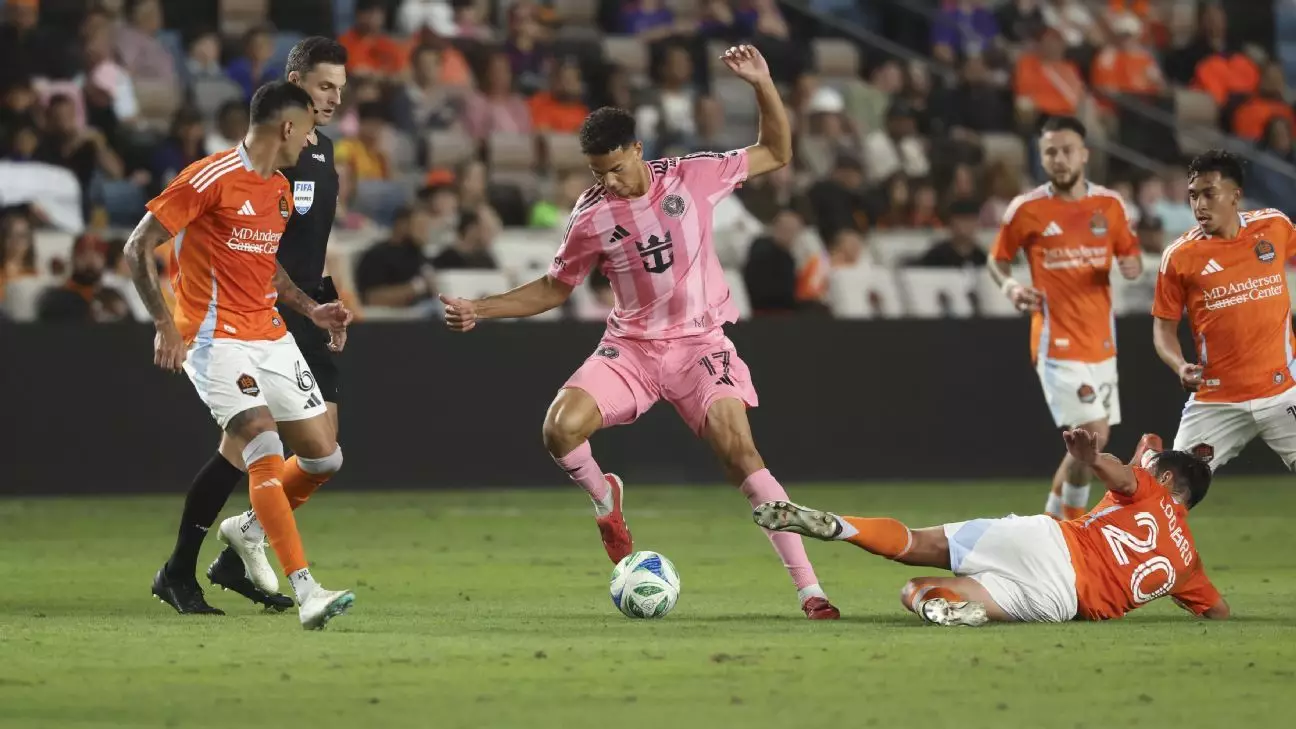Inter Miami CF recently made waves with a resounding 4-1 victory over Houston Dynamo FC, but the celebration has been marred by controversy surrounding a post-match red card issued to defender Ian Fray. Coach Javier Mascherano did not hold back in expressing his disapproval of referee Joe Dickerson’s decision. The incident, which took place as players were heading off the pitch, has ignited discussions about officiating standards and athletes’ conduct in high-stake matches.
The match concluded with Miami taking the lead not only in the scoreline but also in momentum. However, tensions flared when Fray was shown a red card after the final whistle. A tug-of-war ensued between Fray and Dynamo player Ethan Andrew Bartlow, which culminated in Fray responding to Bartlow’s persistent holds. The referee, stationed nearby, interpreted Fray’s reaction as a foul deserving punishment, showcasing a concerning moment for both teams.
Mascherano’s reaction reflects a coach deeply invested in the integrity of his team. “I saw the video. Ian did nothing,” he emphasized, suggesting that the actions observed during the unfolding drama were not enough to justify such a severe penalty. His defense of Fray points to a broader concern regarding officiating and the treatment of players by referees at crucial moments, raising questions about the consistency and clarity of interpretation by referees in tense scenarios.
Mascherano clearly articulated his determination to stand by his players, emphasizing a protective instinct that transcends the scoreboard. “When my players do nothing, I kill for them,” he stated, highlighting the fierce loyalty and dedication he feels toward his squad. Such remarks underline the necessity for coaches to act as shields against external pressures, and the emotional toll that officiating decisions can have on team dynamics.
Moreover, Mascherano hinted at an overarching issue of officiating inconsistencies. He indicated that despite Miami’s commanding victory, referees imposed yellow cards for seemingly innocuous fouls. This reflects frustration not just with a single incident, but a systemic issue that can affect the outcomes of matches and influence team morale.
Despite the turmoil surrounding the officiating, Inter Miami demonstrated impressive team depth, thriving without superstar Lionel Messi in their lineup. The decision to rest Messi came after careful consideration of his recent physical workload, showcasing Mascherano’s strategic acumen in managing player fitness.
Luis Suárez, a seasoned player with a storied career, stepped into the spotlight. His performance was instrumental to Miami’s triumph, as he contributed three assists and a goal. Mascherano praised Suárez’s capabilities not only as an offensive asset but also for his defensive contributions and leadership on the pitch. This dual role emphasizes how valuable Suárez is to the team’s overall performance, proving that success isn’t solely reliant on one star player.
Inter Miami’s focus now shifts to the upcoming Concacaf Champions Cup match against Cavalier FC, where they will seek to maintain their momentum. The team, thriving with new signings like Tadeo Allende and Telasco Segovia, aims to solidify their position in international competition.
The way that Miami handled recent adversity illustrates their growing maturity as a team under Mascherano’s leadership. His ability to navigate challenges—be it through player management or responding to officiating decisions—will be critical as they prepare for what lies ahead in this prestigious tournament.
While the match against Houston Dynamo offered a chance for celebration, it also brought to light serious concerns about refereeing standards and player treatment. Mascherano’s commitment to his players, coupled with the team’s adaptability in Messi’s absence, foreshadows what could be a promising campaign for Inter Miami CF as they strive for consistency and success in their upcoming matches.

